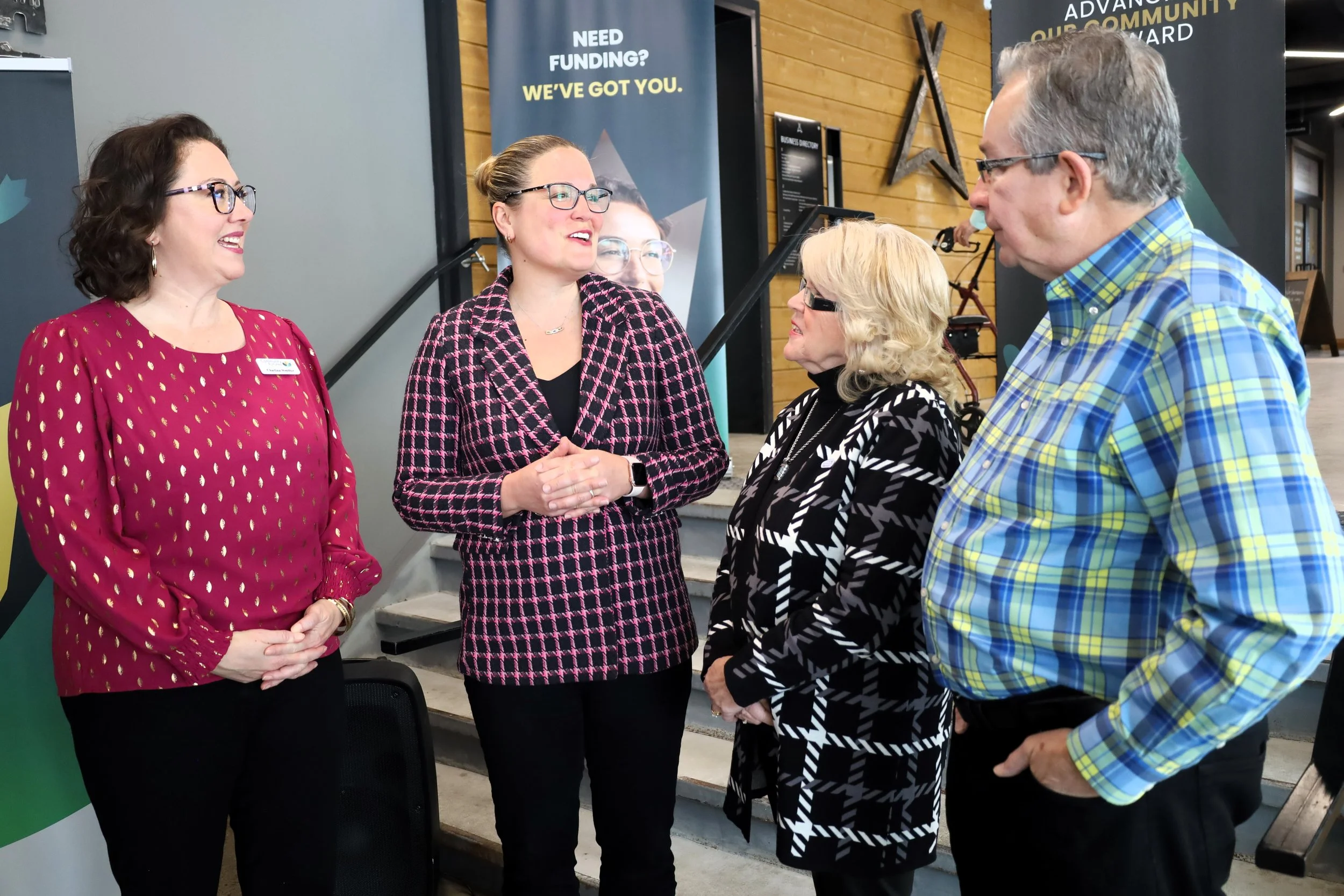Peterborough Blogs
Community Futures Peterborough To Give $50,000 To Peterborough and County Projects In New Funding Program Launch
/Community Futures Peterborough (CFP) has launched a new funding program called the Community Advancement Program (CAP) to distribute $50,000 to projects driving economic stability, job growth and job creation which was announced at the Venture North Building on Tuesday morning.
(From left to right) Charlina Westbye, CFP board chair; Devon Girard, CFP executive director; Bonnie Clark, Peterborough County warden and Jeff Leal, Peterborough mayor. Photo by David Tuan Bui.
The program provides a maximum of up to $5,000 (non-repayable funding) to each successful applicant for their project. It is open to all businesses, not-for-profits and individuals in the City and County of Peterborough.
“The creation of this program demonstrates the commitment our organization has to advancing our local community forward,” said Devon Girard, CFP executive director. “The distribution of $50,000 in our economy should make a real difference to drive various economic development initiatives.”
CFP seeks projects that boost community business attraction, investment, retention and employment. Applications are being accepted until March 8, when a committee will oversee the applicant process following the deadline.
“The Community Advancement Program will boost economic development in our region by helping businesses, non-profits and individuals in the City and County of Peterborough to invest in their community,” said Jeff Leal, Peterborough mayor.
“Community Futures Peterborough, with the support of FedDev Ontario, continues to help our business community reach its full potential,” said Bonnie Clark, Peterborough County Warden. “The CAP program will help businesses to adapt, innovate, and grow to serve our communities including those in rural Peterborough County.”
The federal government funds the money through FedDev Ontario.
CFP will notify selected applicants in April, according to Girard. Applications are available online at CFP’s website.
Engage with us on social media on Twitter, Instagram, Facebook, Tiktok, Youtube and LinkedIn. Write to us at tips@ptbocanada.com. Sign up for our newsletter here.
Check Out The Business Beat This Week Featuring La Mare Brow Bar, Izzi’s Bubble Tea, COBS Bread and Induca House
/PTBOCanada is delighted to be running the Business Beat columns each week here, spotlighting new businesses and startups in Peterborough and the Kawarthas. Here is this week’s edition…
Greetings and welcome to the Business Beat!
I’m Joel Wiebe and I have some big shoes to fill. After 22 years of producing the Business Beat, Stu Harrison has stepped back and handed the reigns to me. I don’t know that I can properly replace Stu, but I’m going to do my best to highlight happenings within the business community going forward.
Keeping with tradition, I work for the Chamber of Commerce, but getting featured in this weekly column is open to any business in the region. I’ve spent the last decade working with businesses in our community and I look forward to digging into the Business Beat every Monday.
First up, La Mere Brow Bar is expanding.
They launched their first location in Lindsay Square Mall five years ago and now they’ve opened a location in Peterborough’s north end at 1097 Water St. They provide hair removal services like threading, waxing, eyelash lift, tint, henna brow, henna art, and brow lamination. Book your appointment or find out more at lamere.ca as well as on Facebook and Instagram.
There’s a new business at 1135 Lansdowne St. W., unit 21 — Izzi’s Bubble Tea and Corndogs.
This new restaurant offers Korean flavours with custom corndogs where you choose your filling, toppings and sauces. You can find them on social media, Skip The Dishes or drop by and try something new.
Peterborough has a new bakery in Brookdale Plaza with the opening of COBS Bread.
COBS offers healthy and delicious high-fibre and country grain loaves baked fresh daily from scratch, as well as sweet treats and buns. Check them out at 863 Chemong Rd.
Let’s welcome Induca House to downtown Peterborough with their newly opened restaurant at 287 George St. N.
They offer Indian, Canadian and Dubai flavours, creating a unique dining experience. Their menu blends the bold and aromatic spices of Indian cuisine, the comforting and hearty dishes of Canadian fare and the cosmopolitan and flavorful influences from Dubai.
Voice of Business: Heat Pump Explainer
/Guest Column by Rebecca Schillemat, Executive Officer of the Peterborough and the Kawarthas Home Builders Association
Heat pumps have gained substantial popularity across Canada due to their energy efficiency and versatility in providing heating and cooling solutions.
These systems utilize a reversible refrigeration cycle to extract heat from the air, ground, or water sources, transferring it indoors during winter for heating and expelling it outside during summer for cooling. This article is about Air Source Heat Pumps (to be referred to as heat pumps). There are also geothermal or ground-source heat pumps available in Canada.
Heat pump technology was first demonstrated in 1748, and the first heat pump was built in 1857.1 Modern heat pumps can heat comfortably in a home with minimal air leakage when the outside temperature is as low as -20 °C. Heat pumps are energy efficient, with the definition of energy efficiency being to use less energy to get the same task done. Natural gas is 98% efficient at heating a space,2 while heat pumps can be 300-500% efficient because they are designed to put out more energy than they take in to run the system.
The Government of Canada has been researching energy efficiency home building and renovations options across Canada through the department of Natural Resources Canada (NRCan) in partnership with the Canadian Home Builders Association (CHBA).3 Together, NRCan & CHBA have been researching Net Zero Home Building for over a decade, including using heat pumps.4 The case studies from across Canada inform guidelines for energy-efficient building.5 The 2020 National Building Code is a 5-tier system, each being more energy efficient. Tier 5 is beyond a Net Zero Home, with Net Zero defined as homes that produce as much clean energy as they consume annually, using on-site renewable energy systems.
A heat pump costs anywhere from $5,000 to 15,000 to purchase and install. Enbridge is offering up to $4,500 for the Clean Home Heating Initiative, and the Canadian Government is offering up to $5,000 with the Greener Homes Grant to install heat pumps in residential homes.
Since heat pumps work by taking outside air and transferring that energy to the inside air, having a leaky home greatly reduces heating efficiency for all heating/cooling systems. The first step in determining how efficient a heat pump is for your home is getting an energy audit by a certified energy advisor, including a blower door test. New homes with an Energy Star Rating have 2.5 Air Changes per hour (ACH), Net Zero homes are 1.5 ACH and the Passive House standard is 0.6 ACH. The air tightness requirement in the National Building Code dovetails to achieve maximum energy efficiency with a heat pump.
Overall, heat pumps offer an efficient and environmentally friendly solution for heating and cooling in Canadian climates. Their ability to reduce energy consumption and greenhouse gas emissions makes
them a compelling choice for residential buildings despite some limitations related to extreme weather conditions and upfront costs. Heat pumps with a backup heating method are an excellent first step in renovating existing homes to be more energy efficient. Heat pumps are an excellent option for new homes to maximize the energy efficiency of new home construction.
The Peterborough and the Kawarthas Home Builders Association (PKHBA) is the voice of the residential construction industry in Peterborough City & County and City of Kawartha Lakes. PKHBA represents over 100 member companies including builders, developers, professional renovators, trade contractors and many others within the residential construction sector. PKHBA had the opportunity to host two education sessions through CHBA’s Local Energy Efficiency Partnerships (LEEP) Program in fall 2023 in Peterborough; one on Mechanical & HVAC systems, including heat pumps and one on the Building Envelope, including windows and insulation.
Content provided by the Peterborough and the Kawarthas Chamber of Commerce.
Engage with us on social media on Twitter, Instagram, Facebook and Tiktok. Write to us at tips@ptbocanada.com. Sign up for PTBOBuzz newsletter here.
CMHA to Welcome New CEO On Feb. 10 After Current CEO to Retire After 32-Year Tenure
/Ellen Watkins has been appointed the newest CEO of the Canadian Mental Health Association Haliburton, Kawartha, Pine Ridge’s (CMHA HKPR’s) by their Board of Directors to be welcomed on Feb. 10, announced on Monday.
Watkins completed her Executive MBA at Queen’s University in 2021 and in October of 2023 completed the Advanced Leadership for Social Impact Fellowship at the Smith School of Business. Photo courtesy of CMHA HKPR.
Watkins steps into the role after Mark Graham’s retirement on Jan. 31 with the latter assisting in the transition through April 2024.
Graham announced his retirement in June after a 32-year tenure while the Board of Directors began the search for his successor. There were more than 100 initial conversations and applications during their nationwide search.
“I look forward to the opportunity to continue to grow and develop our team from the solid foundation built by Mark Graham over the past 32 years,” said Watkins. “I appreciate each member of our CMHA HKPR community, who demonstrate daily the capacity to think about our system in new ways, with the courage to shift to maximize our potential.”
Watkins has been with CMHA HKPR since April 2021 as Director of Corporate Services. She has been involved with the agency’s engagement with the Strategic Plan Art project, Restructuring the Crisis Program and launching 9-8-8, Reevaluating and Renewing the Finance Processes in the Agency.
Prior to CMHA HKPR, Watkins worked at PRHC in Quality and Process Improvement, designing and launching the COVID-19 Vaccine Clinic and Assessment Centre and various other quality projects. Watkins has lots of experience in the private sector, working in managerial roles at Kraft Foods, PepsiCo, Frito Lay and Quaker, according to a press release.
“Ellen is a collaborative, empathetic, visionary leader who will utilize accountability, intentionality, and bravery every day in the CEO role,” said John Lyons, CMHA HKPR Board President.
Engage with us on social media on Twitter, Instagram, Facebook, Tiktok, Youtube and LinkedIn. Write to us at tips@ptbocanada.com. Sign up for our newsletter here.
Capitol Taxi and Call-A-Cab To Merge Operations
/After competing for over 60 years, the two local cab companies Capitol Taxi Ltd. and Call-A-Cab Ltd. are merging operations announced on Thursday morning.
Both cab companies have operated in Peterborough since the 1940s. Photo courtesy of Capital Taxi.
The driver and dispatch operations are being combined according to a press release. The dispatch centre is running out of the Capitol offices at 728 Rye St.
“At this time, in the interests of our customers, our employees and management we have decided to now join together the two taxi operations under the Capitol banner for better service and efficiency,” said Daryl Bennett, Capitol Taxi owner and former Peterborough mayor.
The phone lines remain the same (705 742-4242 and 705-745 2424) and are being answered as ‘Taxi Service.’
“The Donnellys, in exiting the daily taxi service, will continue their school van services and the public garage operations on Bensfort Rd.,” said Bennett.
Engage with us on social media on Twitter, Instagram, Facebook, Tiktok, Youtube and LinkedIn. Write to us at tips@ptbocanada.com. Sign up for our newsletter here.
Voice of Business: Transitioning Medium- and Heavy-Duty to Net-Zero
/Reaching our net zero emissions goals will require de-carbonizing as many areas of greenhouse gas emissions as possible – including vehicle fleets.
Transitioning medium and heavy-duty vehicles away from fossil fuels will be particularly challenging. There’s a new policy primer from the Ontario Chamber of Commerce titled Transitioning to Low-Carbon Fleets in Ontario, which provides some insights in what it will take to make the move.
According to the report, emissions from freight transportation in Canada have increased more than 250 per cent from 1990 to 2019.
Technology options include turning to electric or plug-in hybrid electric vehicles to reduce tailpipe emissions. There is potential that hydrogen fuel cells could be used for emission-free long-haul deliveries. Another area of development is around clean fuels, including renewable natural gas and diesel.
The OCC breaks down its recommendations into four categories:
Clean energy supply
Going electric is going to require significant investments in clean baseload power. Right now, 75 per cent of power generation in Ontario comes from nuclear and hydroelectric and we will need more overall power output to meet growing demand.
Recommendations:
Prioritize procurement and financing of clean baseload electricity infrastructure projects.
Work towards a more flexible and streamlined regulatory framework for clean energy projects. For example, environmental and safety assessments approved by one level of government should be able to form the basis for approval by another government and for the expansion or continued operation of those sites.
Set supply targets and incentivize production of hydrogen, RNG, and renewable diesel, borrowing best practices from British Columbia’s Low-Carbon Fuel Standard.
Charging and refueling
Charging and refueling continue to be big barriers to clean tech adoption. While we have made significant progress in adding more charging stations, most of that is focused on consumer vehicles and are not suitable for medium and heavy-duty fleet operators.
Recommendations:
Expand and incentivize investments in charging and refueling station infrastructure for low-carbon commercial fleets across major supply chain and commercial transportation routes.
Expand electricity distribution infrastructure across the province to support the added charging infrastructure.
Implement an alternative electricity rate structure for commercial EV fleet operators to incentivize time-of-use behaviours and reduce cost barriers.
Work with industry and post-secondary institutions to ensure Ontario’s workforce has the skills needed to build and operate low-carbon transportation infrastructure.
Clean technologies for medium- and heavy-duty vehicle classes
The electric vehicle market is developing quickly, but alternatives that may be better suited for medium and heavy-duty vehicles need investment. These include hydrogen and renewable natural gas vehicles.
Recommendations:
Invest in low-carbon vehicle research and development programs at Ontario’s post-secondary institutions to support the advancement and commercialization of new technologies for medium- and heavy-duty vehicle classes.
Recognize RNG as a zero-emission technology solution.
Recognize the contribution of low-carbon intensity liquid fuels as part of the transition while low-carbon vehicle technologies advance.
Purchase incentives
The cost of purchasing low or zero-emissions fleet vehicles is a major barrier for businesses.
Recommendation:
Consider adopting a low-carbon vehicle incentive program for commercial fleets to complement the federal iMHZEV program and Green Freight Program, and match the incentives found in British Columbia and Quebec.
Content provided by the Peterborough and the Kawarthas Chamber of Commerce.
Engage with us on social media on Twitter, Instagram, Facebook and Tiktok. Write to us at tips@ptbocanada.com. Sign up for PTBOBuzz newsletter here.
StoosNews Spotlight: Check Out The Business Beat This Week Featuring Stu Harrison
/PTBOCanada is delighted to be running StoosNews columns each week here, spotlighting new businesses and startups in Peterborough and the Kawarthas. Here is this week’s edition…
About 22 years ago I started compiling local business news for a weekly feature called the Business Beat. It came from a deep appreciation for small business people and what they go through to start a business and what they contribute to our community and it gave me the chance to stay connected to the media, a life-long love of mine.
But one morning, just a few Wednesdays ago, I woke up with a feeling that it was time to pass it on. I say Wednesdays because every Wednesday for 22 years I've spent about four hours researching, compiling, writing, recording and posting The Business Beat. I usually cover four stories a week, about 48 columns a year and 22 years of that adds up to just over 1,000 Business Beats, 4,000 businesses and about 500 eight-hour days of volunteer time. And yes, this is a volunteer thing I do, I don't get paid and no, you don't have to pay to appear in the Business Beat – I just wanted to clear up a few misconceptions...
I want to say thanks, to my wife Signe for putting up with all those Wednesday evenings with me at my computer and to those thousands of businesses who took a run at their dream. Many reached out after they appeared in this column to tell me what a difference it made, proving the power of the medium.
I'm very glad to tell you that Joel Wiebe, Vice President Government Relations at Peterborough and the Kawarthas Chamber of Commerce has agreed to take over The Business Beat so this little kick-start for local businesses will continue. Joel is a journalist and I know he'll continue to snoop out good stories every week. The next couple of Mondays are Christmas Day and New Years Day so Joel will fire up his version of The Business Beat the second week of January.
And That... is the Business Beat for this week… From my family to yours, Happy Holidays.
“Like” StoosNews page on Facebook here!
Engage with us on social media on Twitter, Instagram, Facebook and Tiktok. Write to us at tips@ptbocanada.com. Sign up for PTBOBuzz newsletter here.
Stu Harrison to Retire From 'Business Beat' Column; Chamber of Commerce's Joel Wiebe To Take Over
/After retiring from the Peterborough and the Kawarthas Chamber of Commerce as CEO in November of last year, Stu Harrison is also turning the reins over to his weekly Business Beat column.
File Photo.



























